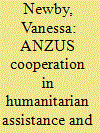|
|
|
Sort Order |
|
|
|
Items / Page
|
|
|
|
|
|
|
| Srl | Item |
| 1 |
ID:
176227


|
|
|
|
|
| Summary/Abstract |
This article discusses how the ANZUS states of United States, Australia, and New Zealand that sit on the fringes of the Asia-Pacific, are increasingly using their armed forces to deliver Humanitarian Aid and Disaster Response (HADR) as a way of engaging with the region. This is a neglected topic both in international relations and research on regional security in the Asia Pacific. This assessment reveals new developments in regional engagement between the ANZUS states and the Asia-Pacific. It finds that despite a shared language, broadly similar regional goals, and a need for interoperability; the ANZUS alliance itself does not appear to be driving closer military coordination on HADR. This article finds instead that HADR is being used to build new informal security networks that combine traditional and non-traditional security threats as a form of soft balancing against China.
|
|
|
|
|
|
|
|
|
|
|
|
|
|
|
|
| 2 |
ID:
148888


|
|
|
|
|
| Summary/Abstract |
Energy is a vital component of development and its utilization pattern
is significant determinant of the growth of a nation. So its quantity,
quality and sources of availability are important elements in the
measurement of a country’s comprehensive national power. Rapidly
increasing energy demand and growing concern about economic and
environmental consequences call for an effective and thorough energy
governance in India. Strengthening our fuel reserves and diplomatic
relationship with a wide range of oil rich nations; developing technology
to nurture indigenous energy resources such as hydroelectricity, wind
and solar energy along with efficient machines/mechanisms for energy
use/distribution and honest policies framing to get rid of ambiguity
over all these issues can be the panacea for resolving the energy crises
in India.
|
|
|
|
|
|
|
|
|
|
|
|
|
|
|
|
| 3 |
ID:
083530


|
|
|
|
|
| Publication |
2008.
|
| Summary/Abstract |
The transnational security challenges posed by non-traditional security (NTS) issues like pandemics are pushing ASEAN to deepen regional security cooperation. However, unless regional efforts at addressing complex NTS threats like pandemics are reinforced by a more holistic, human security approach, many of the current initiatives will remain inadequate
|
|
|
|
|
|
|
|
|
|
|
|
|
|
|
|
| 4 |
ID:
165528


|
|
|
|
|
| Summary/Abstract |
Non-traditional Security (NTS) issues, in recent times, have drawn heightened global attention and achieved undeniable prominence. Since the end of the Cold War, the world has witnessed unprecedented events compelling scholars and analysts to conceptualize or re-conceptualize the changing nature of threats to security in an increasingly interdependent and complex world. The past decades have been stunned by increasing numbers of terrorist attacks, state failures, deadly epidemics, rapidly fluctuating world energy and food prices, a global economic meltdown, and extensive natural disasters like cyclones, earthquakes and flooding. All these events led to the development of an alternative paradigm of security, i.e., NTS that focuses less on conventional military threats which has largely been defined in geopolitical and geostrategic terms and confined to the relationships among nation-states and their military strengths. However, NTS, though is a popular concept, remains ambiguous within and outside the academia; and in whatever context the NTS issues are coined together, Bangladesh as a developing country surely faces numerous NTS threats. Hence, the country needs to prepare itself to counter the challenges emanating from a host of NTS threats it is facing now or likely to face in near future. Against this backdrop, the paper has endeavoured to provide a brief conceptual understanding of the term NTS by delineating different explanations of the concept by renowned scholars and experts. It is argued that NTS is a useful framework of analysis to operationalize the concept of security in economic, social, political and internal security contexts. The paper also provides some arguments as to the need for ‘prioritization’ in curbing various NTS threats of Bangladesh, given the country’s limited resources and capabilities. Keeping this point in view, the paper finds that Bangladesh is apparently managing the challenges well, but it needs to undertake proactive measures and policy options incorporating a dynamic and adaptive security framework, seek international cooperation and devise a comprehensive approach to meet the present and future NTS challenges of the country more effectively.
|
|
|
|
|
|
|
|
|
|
|
|
|
|
|
|
|
|
|
|
|